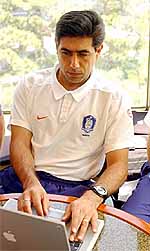Afshin Ghotbi
 |
| Afshin Ghotbi |
After two spells as "number three", Afshin Ghotbi has returned for a third term in South Korea. This time however, he is the second-in-command behind new head coach Pim Verbeek.
The faces may be familiar but the situation is not. There is no longer a World Cup on the horizon but rather a chance to build a team from scratch, to lay the foundations of a healthy national set-up.
That future may be starting right now with qualification for the 2007 Asian Cup and upcoming games with Iran and Taiwan to think about but the recent World Cup, Ghotbi's second with Korea and third overall, is still fresh in everyone's minds. The resident of Southern California was in the thick of the action during those three intense games against Togo, France and Switzerland that ultimately ended with the Taeguk Warriors narrowly failing to progress to the second round.
The 42 year-old remembers the events of Germany well." We set a goal of four or five points which we thought was achievable… When you look at it objectively and take all your emotions out of it, we showed well. But you can't go to a World Cup into a tough group and concede a goal in each first half of the three games and expect to get out of the group."
A win against Togo in the opening game was an historic first in an overseas World Cup though some parts of the Korean press, and the neutral spectators in Frankfurt, weren't impressed with the way the team chose to defend its narrow 2-1 lead against the ten-man African team – spending the last minutes of the game choosing to keep the ball rather than attack.
Ghotbi is unrepentant and insists all the staff would do the same again. "Togo was dangerous from the beginning to the end in attack. We had to get three points from that game. Korea had never won a game in a World Cup abroad. Psychologically, those three points were so important."
The team and fans then moved east to Leipzig and a date with eventual runners-up France. After spending much of the game on the back foot, the Asian team grabbed a 1-1 draw courtesy of a late Park Ji-sung equalizer.
"For us to get one point from that game was a great achievement," Ghotbi recalls. " They had some of the best players in the world – champions of great teams in the most important leagues in the world."
That night in the Saxony city, the parties continued into the night as the 2002 semi-finalists looked set for the second round but the dream disappeared on a steamy Hanover evening and a 2-0 victory for Switzerland. The second goal came in controversial circumstances - with the majority of Korean fans and players believing the goal should never have counted – the new number two agrees.
"In my opinion, their second goal was offside and that really broke our back. In a game like that you need balls to bounce your way and they didn't and you need calls to go your way. But we lost to a good team."
Earning such a label for South Korea is what the coaching staff is planning to do. Ghotbi is an experienced analyst and knows the problems that need to be ironed out.
"Our final pass was poor, we needed too many chances to score goals, the backline has to play better football and we were not capable of it."
In his third spell with the national team and a stint with K-League powerhouses Suwon Samsung Bluewings, Ghotbi knows the domestic set-up as well as any outsider. He points to a league that isn't of the highest standard, overseas-based players that spend most of their time on the bench and Korea's tendency to hype young, promising players as problems that need to be solved.
With a two year contract in place, there is a chance for Ghotbi to assist Verbeek in doing just that. During August the buzzword heard on the training pitch and in press conferences has been "intelligence".
"I think the most important thing is we need to identify players who have a football brain and find a way to combine that with the fighting spirit of Korean players, the physical qualities, the pace and the energy."
"The objectives are simple: Be number one in Asia by 2007, try to reach the last six or eight in the Olympics and then be in a position to go to the second round of the next World Cup."
While the aims have been clearly set there is much work to be done to achieve them. Ghotbi has often talked about improving the domestic league, a subject that is receiving more and more column inches in the Korean press.
The K-League is not in a dire a state as some of the more excitable dailies would have one believe but it is clear that standards need to be raised on and off the pitch and not just for the sake of the national team. To that end, better communication with the domestic coaches is necessary – a relationship that would be two-way but Ghotbi knows what he would like to tell the K-League bosses.
"On the practical side, too many teams play defensively, too many of them play –and I don't want to offend anybody -noodle football. There's running everywhere, there's a lot of energy, a lot of fight but very little organization.
"The K-League teams need to look at trends in international football – the ways of playing and the ways of training around the world - shorter training, more quality -more tactical, less running, running, running. We need football players, we don't need just athletes."
Copyright © John Duerden and Soccerphile.com
